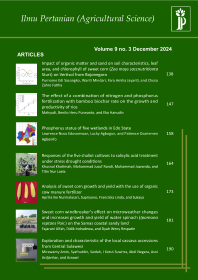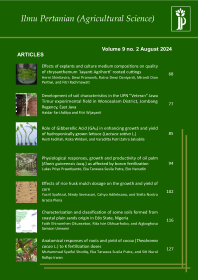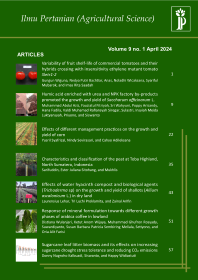Risk Management Strategy on Shallot Farming in Bantul and Nganjuk Regency
https://doi.org/10.22146/ipas.12534
Fuad Hasan
(1*) , Dwidjono Hadi Darwanto
(2) , Masyhuri Masyhuri
(3) , Witono Adiyoga
(4)
(1) Department of Agribusiness, Faculty of Agriculture, Trunojoyo University, Madura
(2) Department of Agricultural Socio Economics, Faculty of Agriculture, Universitas Gadjah Mada
(3) Department of Agricultural Socio Economics, Faculty of Agriculture, Universitas Gadjah Mada
(4) Indonesian Vegetable Research Institute
(*) Corresponding Author
Abstract
The objectives of this research were to understand farmers’ perception to risk and risk management strategy on shallot farming. The research was conducted in Bantul and Nganjuk Regency. The number of samples taken were 57 farmers in Bantul and 90 farmers in Nganjuk. Analysis used was frequency table that disaggregate based on agroecosystem and cropping pattern. The result showed that according to farmers’ perception, production and price risk were high. Farmer's decision to follow dominant cropping pattern and production system reflected on the ex ante risk management strategies done by the farmers as their own respection. In the interactive risk management strategies, farmers tended to use chemical fertilizers over chemical pesticides. In ex post risk management strategy, in the failure of shallot farming, they kept cultivating shallot that their capital got on cash and input for shallot farming.
Keywords
Ex Ante, Ex Post, Interactive, Risk Management, Risk Perception
DOI:
https://doi.org/10.22146/ipas.12534
Article Metrics
Abstract views : 2474
|
views : 2460
Refbacks
There are currently no refbacks.
<div class="statcounter"><a title="Web Analytics" href="http://statcounter.com/" target="_blank"><img class="statcounter" src="//c.statcounter.com/10932543/0/2e122c85/0/" alt="Web Analytics"></a></div>













